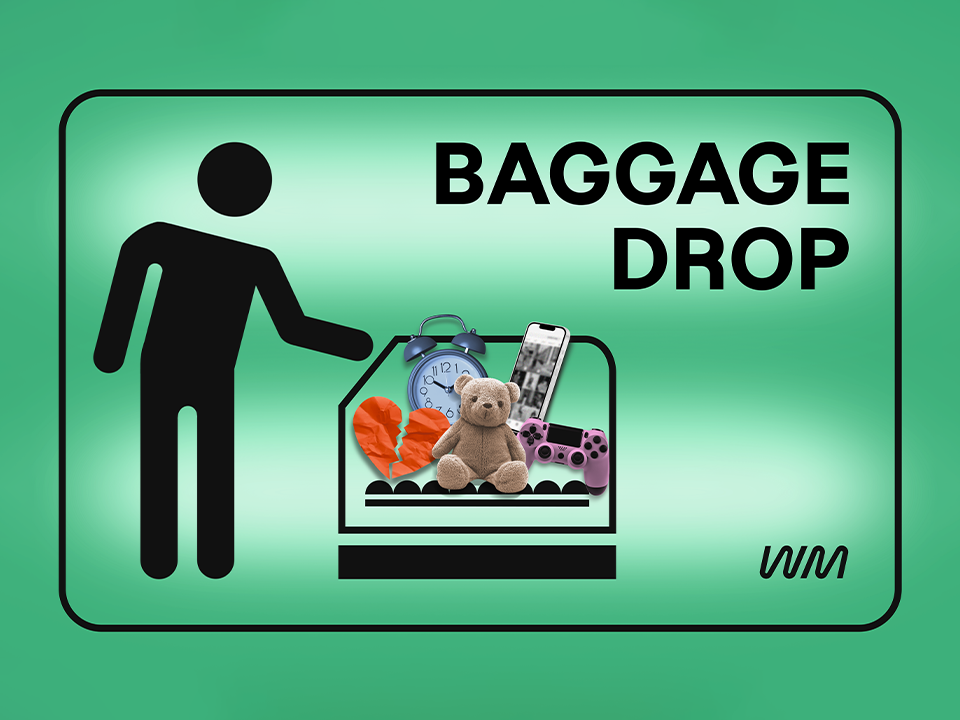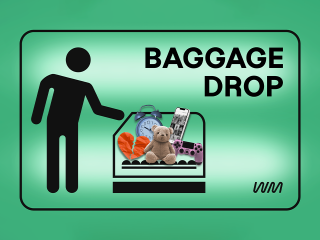
Jessica Stern, PhD
Licensed clinical psychologist, consultant, and clinical assistant professor at NYU Langone Health specializing in trauma, PTSD, anxiety, depression, substance use, and adult ADHD
Welcome to Baggage Drop! Wondermind’s expert-led podcast on creating healthy habits to make a personal impact on your life. This first episode, hosted by clinical psychologist Jessica Stern, PhD, focuses on neuroplasticity, the brain’s ability to prune and replace unhelpful habits, to help you get closer to living your ideal life.
Download the How to Make a Change and Actually Stick to It worksheet!
Learn more about Dr. Jessica Stern
Try Dr. Stern’s "Productivity Powerkit" workbook
Research on neuroplasticity
As a performance brand for over 70 years, the ASICS philosophy mixes human-centric science with charitable partnerships, and the belief that mind and body are linked…so working on both fuels your power to uplift yourself, and other people. Nothing’s more powerful than mental health. So after this podcast’s mental boost, learn how ASICS can bring that ethos to your life by heading to asics.com. ASICS—sound mind, sound body.
(BAGGAGE DROP THEME BEGINS)
JESSICA STERN, PHD, HOST: Recently, we asked the Wondermind community: "If you could wave a magic wand and your life would instantly change for the better, what would that ideal life look like for you?"
[VOICE CLIP 1]: Not having to struggle with just, like, everyday tasks, interactions, just being able to get my work done, keep my room clean.
[VOICE CLIP 2]: If I could wave a magic wand and my life would change for the better…One thing I would hope for is that everybody in the world that surrounds me feels included.
[VOICE CLIP 3]: My ideal life would probably be using my past traumas and experiences through hardship to show people that they are not alone.
[VOICE CLIP 4]: I've got a dog that I just love to pieces. So I guess if I were to wave a magic wand and try to make my life a little bit better, the only thing I could really think of is for him to live as long as I do.
[VOICE CLIP 5]: It would be a life free of anxiety, free of panic attacks, free of negative thoughts… a life of peace.
[VOICE CLIP 6]: If I could change something, it would be to have better access to mental healthcare and just healthcare in general.
DR. STERN: Well, you’ve come to the right place. Welcome to Baggage Drop, where we will help you let go of whatever’s weighing your mind down, so you can reach higher heights when it comes to your mental health.
Hi there! I’m Dr. Jessica Stern. I’m a clinical psychologist, a faculty member at NYU Langone Health, and I’m on the advisory committee at Wondermind.
The Wondermind team created Baggage Drop to give you the tools and techniques to make meaningful changes in your daily life, and we’ve got episodes dropping on Mondays, Wednesdays, and Fridays each week during Mental Health Awareness Month.
And just so you know, the most important step you made today was tuning in, so simply by showing up, you’re already on the right track. So grab yourself a treat, because you deserve it.
(BAGGAGE DROP THEME ENDS)
But, since time is always ticking, and this episode will be over in less than 10min, I’ll keep chats quick and, most importantly, helpful for you. So let’s go!
(MUSIC BEGINS)
Research has shown that practicing neuroplasticity—the pruning away at weaker brain connections to create opportunities for your mind to adapt, make new connections, and change—can help you learn new subjects, enhance your cognitive capabilities, and boost your brain’s overall mental fitness. And Baggage Drop is here to help you do just that for your mental health. “But,” you say, what’s that got to do with baggage?
PIA GLENN, PRODUCER: We're talking about emotional wellness. We're a podcast called Baggage Drop. Do you have any emotional baggage going on?
[VOICE CLIP 7]: Um, I'd rather not do this right now.
PIA: OK. (laughs)
[VOICE CLIP 8]: Let me think. I have to think. I'm sure I do. I just (laughs) really need to think about it. (laughs)
[VOICE CLIP 9]: I think we all do.
[VOICE CLIP 10]: I feel like I feel a lot of existential dread…
[VOICE CLIP 11]: I think I'm fresh out, fresh out of emotional baggage.
PIA: Wow. How have you, how have you reached that state?
[VOICE CLIP 11]: Uh, boba.
[VOICE CLIP 8]: I literally just moved, so I feel like I have less baggage than I had before, really.
PIA: Oh, OK. Moved to more peaceful-
[VOICE CLIP 8]: Yeah.
PIA: Surrounding?
[VOICE CLIP 8]: Yeah, exactly that. So it's actually, um, a lot less baggage (laughs) at the moment.
PIA: Sir? Emotional baggage?
[VOICE CLIP 12]: Yeah. I had some, but it got lost at the airport.
DR. STERN: Well, I guess it’s better to lose your emotional baggage than it is to lose your actual baggage at the airport, am I right?
(MUSIC ENDS)
That was Wondermind producer Pia Glenn talking to people out on the Santa Monica Pier.
First, and foremost, I want to clarify that the word “Baggage” can mean different things for different people. In the way we’re using it here, “baggage” is anything—even a thought—that could be weighing you down and holding you back. It’s what stands between you and the ideal life that you want to lead. We want to get rid of that baggage’s weight on your choices, so that way you can take steps towards healthier choices.
(MUSIC BEGINS)
So the question we’ll keep checking in with, over the next few weeks, is: “If I make this change now, how does it get me closer to the life I want to lead?”
So for instance, if I start saving a percentage of each paycheck, how will it help me accomplish what I want? The answer to that question can help you figure out your “Why.” That’s your north star. AKA your values, which are the directions that you want to live your life. So, why do you want to save money?
Will it make you feel better? Will it help you make different choices? Are you doing it for yourself? Or for someone else in your life?
Go ahead and pause if you want more time to think about it.
Now that you’ve got a clearer picture of your values, let’s take it a little further.
Your values shape, and are also shaped by, your goals. Goals are the concrete steps and situations you’ve got that align with your values. For instance, maybe you’ve had an “Ah ha!” moment, where you’re suddenly inspired, or realize something new about yourself.
And in that moment you wanted to share that “AH HA idea” with a friend.
Whatever circumstances brought that feeling about might help you get closer to your “Why.”
Another example of this is that you may want to be more supportive of your partner (that’s your value, your “why”) and the goals you’d set to get closer to that value might be as focused as practicing active listening when your partner is unhappy, or as broad as making sure daily housekeeping chores are completed by the time your partner arrives home from work.
So to get into your values and goals a little bit deeper, another question I like to pose to my clients is this: What’s working in your daily life? And this is a two-parter, what’s NOT working in your daily life?
Got that?
Even if you don’t have an idea of what matters most, you can zoom out and ask, what general life categories are important to you?
Is it your relationships? Maybe your family? Your health? Or it could be a spiritual practice?
And which of your goals help shape your values?
I’ve even used this line of questioning to help some of my clients: where do you spend most of your time and energy and does it fill you up? Also, what does your life look like in 10 years?
(MUSIC BEGINS)
For a little bit more inspiration, here’s what Wondermind social media followers told Wondermind they’re hoping to work on:
[VOICE CLIP 13]: I want to learn how to balance my nutrition better.
[VOICE CLIP 14]: A debt-free life. I would not have student loan, I would not have car loan, I would not have credit bills. I think a lot of this debt that I'm having is putting a lot of weight on my shoulder. So if I could change my life, I would definitely work on being debt free.
[VOICE CLIP 15]: I want to work on my health. I feel like I could definitely exercise a lot more and be more active. I slowed a lot down during the pandemic.
[VOICE CLIP 16]: This month I’m going to try to sleep in my bed with my phone in the other room. I know, tough thing to do.
DR. STERN: Clearly we all have something we want to improve. So, now let’s revisit the exercise for this episode. If you have one within reach, I want you to go ahead and get out a pen and paper. And if you don’t want to write it down, you can look into a mirror or just do this in your head. But I want you to ask yourself that question again: “What’s working in my daily life?” And “What’s not?”
Then do a bit of free writing or free thought:
Start with a clear picture of your values. Just try to get it as simple as possible. Just a few words.
And now, to fit each value, state what goals you can give yourself to get closer to that. That’s what you call your “North Star.”
It can also work in reverse. So if you’ve got goals set in the beginning, that can help you hone in on what your core “Why” is, or what your values might be.
(BAGGAGE DROP THEME BEGINS)
And that’s it! That’s the values and goals brainstorm to help you make sure your choices are fitting what your mind needs more of. And hopefully that thought process can help you check in & be sure all your moves keep you on the right track.
Did you enjoy this episode? Maybe learn something new?
Leave Wondermind a quick voicemail at the link in our show notes, and tell us what new habit you’ll be starting this month OR share what baggage you hope to drop. Your voicemail might even get featured on our Friday recap!
Thanks for joining me today! And tune back in on Wednesday for our next installment of Baggage Drop!
(BAGGAGE DROP THEME ENDS)
Credits:
Senior Producer: Marisa Bramwell
Senior Writer: Amy Thompson
Producer: Jennifer Bassett
Producer: Pia Glenn
Audio Engineer: Joel Edinberg
Music: Epidemic Sound
Wondermind does not provide medical advice, diagnoses, or treatment. Any information published on this website orby this brand is not intended as a replacement for medical advice or a substitute for the advice of a professional, and you should not rely on it. Always consult a qualified health or mental health professional with any questions or concerns about your mental health




